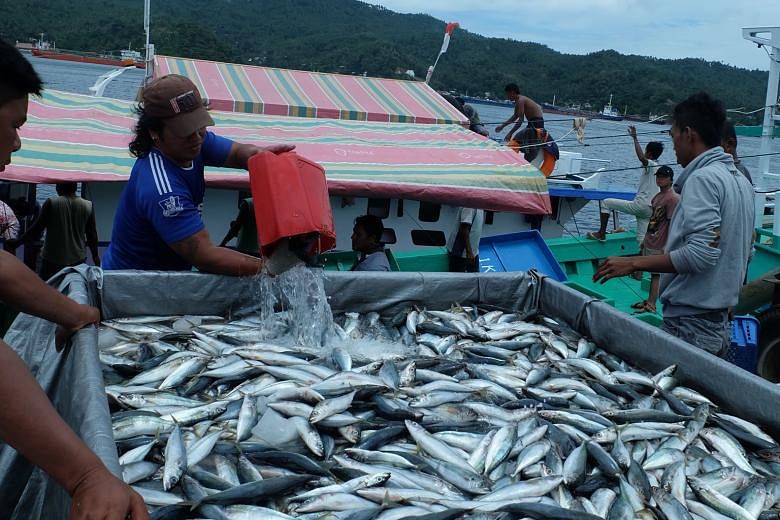Fishing captain Wahyu Sumantri used to helm a 700-ton vessel that sailed the Celebes Sea from North Sulawesi.
These days, he can be found peddling mie ayam, or chicken noodles, from a push cart in his home town of Kerawang, in West Java, about two hours from Jakarta.
"Hopefully, this is just like a long break for me and I will land a job at sea again soon," he told The Sunday Times. The 38-year-old, who has a degree in fishery technology, lost his job last year after the government deemed his vessel illegal because it was not locally built.
The move was among a series of tough measures introduced by Maritime Affairs and Fisheries Minister Susi Pudjiastuti in late 2014 to tackle illegal fishing across Indonesia.
It is also a key plank in President Joko Widodo's bid to transform Indonesia into a maritime power and also improve the livelihoods of its 2.4 million fishermen.
Ms Susi also banned fishermen from unloading their catch out at sea because the other boat, especially if it is a foreign vessel, often bypassed local ports and port controls by taking the fish elsewhere.
This practice is known as at-sea transshipment, but illegal transshipment has reportedly caused annual losses of US$20 billion (S$27.8 billion) to Indonesia's fishery sector.
Mr Wahyu's fishing boat is now one of the many such vessels lying idle in Bitung, North Sulawesi. Similar scenes can be seen in nearby Ambon, Maluku.
Bitung is home to the country's largest fish processing firms, which include tuna canneries and processing plants, employing tens of thousands of locals.
Industry players there, however, say they have been hit hard by Ms Susi's tough policies against illegal, unreported and unregulated (IUU) fishing. The ban on transshipment and use of foreign fishing boats, in particular, has led to a severe cut in fishing resources for these firms.
What this means is that they do not have enough boats to bring in sufficient fish stocks for export.
The utilisation of total tuna cannery capacity in Bitung, for instance, has fallen to just 6 per cent - or 90 tonnes a day - from 50 per cent two years ago, said Bitung's fish processing firms association chief Basmi Said.
He told The Sunday Times that the industry employed about 12,000 workers in 2014 but almost 10,000 have since been let go because fish processing firms were not running at maximum capacity.
Indonesia's central bank confirmed in a recent report that unemployment in North Sulawesi had surged 23.75 per cent to 99,000 by end-August compared with a year earlier. "Impacts from the transshipment ban have lingered, leading to low job creation in North Sulawesi," said thereport.
Figures from the Maritime Affairs and Fisheries Ministry indicate that exports from Indonesia's fishery sector declined from 4.64 million tonnes in 2014 to 3.94 million tonnes last year.
In the same period, fish unloaded at ports in Bitung, nicknamed Kota Cakalang, or Skipjack Tuna Town, dropped to 49,484 tonnes, or about a third of the haul in 2014.
The lack of fish stocks has also led to a Bitung plant having to import tuna - for the first time in recent history - from India and South Korea to fulfil minimum orders just to stay afloat, said Mr Basmi.

Industry players such as Mr Basmi and Mr Rudy Walukow, the chairman of the North Sulawesi Fishing Vessels Association, hope that the fisheries ministry will ease its rules to help revive the fishery sector.
The ministry's acting director- general for sea fishing M. Zulficar Mochtar, however, dismissed their claims. He told The Sunday Times that idle facilities in Bitung were a longstanding issue and that the ban was not the cause.
Asked to comment on Mr Basmi's complaints, Ms Susi said the Bitung fish cannery firms had themselves to blame. "They did not pay the fishermen for the fish they were supplied with," she said. "So now they are having problems getting the fish because local fishermen do not want to sell to them."
Indeed, while larger industry players are affected by anti-IUU measures, small-time fishermen in Bitung and Ambon have benefited.
Local fisherman Dono Ponto and others like him who ply their trade off the coasts of Maluku and North Sulawesi used to struggle to fulfil their daily quota.
Their small boats could not compete with the larger foreign vessels, including hundreds used by poachers in Indonesia's waters.
But the 30-year-old, whose family has for generations relied on the sea for its livelihood, no longer has to compete with poachers and larger foreign vessels.
Mr Dono said the tuna catch for him and 12 other fishermen in the area has doubled to 10 tonnes since the ban was put in place.
It is the same for Ambon fisherman Eki Mokodongan, whose catch has also doubled.
"Fish are easier to find now that the big ships are not around," said the 59-year-old.
Indonesia's central bank, however, said that while traditional fishermen were catching more fish, they cannot meet industry demand.
Mr Rudy said while he supports the anti-IUU move, he hopes transshipment activities will be allowed because not all of them are illicit.
He explained that it was not efficient for smaller fishing boats to make repeated trips back to port to unload their catch.
"There is also good-faith transshipment where we transfer the fish at sea for efficiency," he said.
"If you want to kill a mouse, don't burn down the house."
A senior executive in a Bitung cannery, who asked not to be named, suggested that the government allow the selective use of foreign- built vessels "as long as they are operated by the local companies and can prove all the catch is brought to Indonesian ports for unloading".
"Locally built fishing vessels are not as well-made and stable," said another executive of a fishing company in Ambon.
Ms Susi, however, has said that the government has no plans to relax its ban on transshipment and the use of foreign fishing boats in Indonesia further.
President Joko, during a visit to the Natunas on Oct 6, reaffirmed his commitment to restructuring the local fishing industry and resolving IUU fishing, but hinted that it will take time before results can be felt.
"We have to manage it step by step, as we should not return to the era when the rich sea has no regulations at all," he said.


